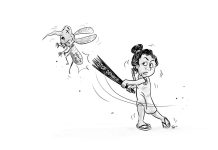By HERBERT VEGO
THE other day, CNN interviewed friends and fellow actors of the late Hollywood comedian Robbin Williams. All of them gasped in disbelief that the person who had produced smile and laughter in worse-situated patients yielded to depression over Parkinson’s disease, hanging himself to death. With all his money, could he not have fought depression with the aid of anti-depression drugs?
So far, nobody from the actor’s family has confirmed whether Williams had resorted to prescription drugs.
Assuming, he had, he still might have failed to shake the blues.
According to Dr. Paul Anderson, an evolutionary biologist and professor at McMaster University in Ontario, Canada, antidepressants are just a “quick fix” for shaking the blues. Case studies on people taking these drugs have indicated “doubling their risk for a relapse of major depression.”
While that is not what the doctors who prescribe Prozac, Zoloft, and Paxil say, Anderson’s research indicates that prolonged use tapers off their effectiveness; takers eventually resort to stronger drugs.
Anderson believes that depression actually prepares the body to deal with stress, just like fever that helps the body fight infection.
Depression indicates an imbalance of neurotransmitters in the brain, namely serotonin, norepinephrine, and dopamine, which dictate the way an individual thinks, behaves, and feels.
Anti-depression drugs alter the levels of the neurotransmitters, disrupting the body’s natural regulatory process. Consequently, when the patient quits taking the drug, the brain overcorrects and triggers deeper depression.
To test this theory, Dr. Anderson and his team found that, on average, patients who took the drugs and then stopped had a 42 percent risk of relapse. Conversely it was only a 25 percent risk for those who had never “drugged.” Users are stuck in a cycle where they need to keep taking antidepressants to prevent a return of symptoms.
Not only do the drugs not work; they cause side effects in men, including problems getting an erection, sexual dysfunction, decreased libido, and lack of orgasm.
But why are antidepressants so popular?
A study done by the John Hopkins Bloomberg School of Public Health found that they are being pushed by an $11 billion industry which leads patients to believe that they are the only way out of depression. In fact, about 8.9 percent of the US population is taking antidepressant drugs.
Promoters of “natural medicine” are cashing in on Anderson’s research by recommending “all-natural alternatives that you can turn to.” One of them is St. John’s Wort, which is classified as “supplement.”
I am not endorsing that though. Whenever depressed, I take my mind off problems by writing, which demands full concentration.
I also love to eat and slurp shabu – err, make that “shabu-shabu.”
***
Vice President Jejomar Jejomar Binay showed his true color when he declared he would still run for President in the event a “Cha-cha” pushes through to allow PNoy to run for re-election.
It unmasks his greed for power, considering that he used to play “friend” of the PNoy.
So now he would have a hard-time fending off a Senate investigation being initiated by Sen. Antonio Trillanes IV on his role in the anomalous P1.5 billion “parking lot” in Makati City. Trillanes yesterday announced it was much more than that, even more than P2 billion.
If Trillanes is correct, then Binay has now sufficient funds to “buy” the Commission on Elections, Social Weather Stations and Pulse Asia for a “convincing” win.
We have yet to hear Mar Roxas put up an offensive front. But if he is still bent on succeeding PNoy, this is the right moment to do it./PN







